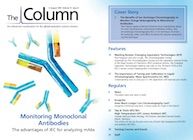UK Launches Community for the Analytical Measurement Science
The Community for the Analytical Measurement Science (CAMS) was officially launched on 27 June at the Royal Society of Chemistry, Burlington House, London, UK.
The Community for the Analytical Measurement Science (CAMS) was officially launched on 27 June at the Royal Society of Chemistry, Burlington House, London, UK.
An industry-led membership network, CAMS represents the first group of its kind and is dedicated to developing research, training, and innovation capabilities in analytical measurement science across the UK and Ireland.
The intention of CAMS is to address the threat of declining skills in analytical measurement science across the UK and Ireland, building on the results of a Royal Society of Chemistry Analytical Division’s landscaping exercise and subsequent EPSRC review of analytical science that identified the importance of a healthy analytical measurements science strategy for the UK and Ireland.
To solidify this commitment, CAMS intends to strengthen the existing networks of chemical and bioanalytical measurement excellence throughout the UK and Ireland through an expansion of the regional “centre” for academic training (MSI) and the analytical quality assurance-training institute (BEAM).
“Few things are as important for a modern economy as measurement. Its strategic value is often underappreciated, even though estimates suggest £650 billion of the UK’s trade for physical goods alone relies on sound measurement practice,” said Julian Braybrook, UK Government Chemist and Director of Measurement Science and Partnerships.
Over £15 million in funding has been committed to date from the Analytical Chemistry Trust Fund (ACTF), the Department for Business, Energy, and Industrial Strategy (BEIS), the Medicines Manufacturing Industry Partnership (MMIP), and over 15 industry and 10 academic members.
For more information, please visit www.cams-uk.co.uk

Evaluating the Accuracy of Mass Spectrometry Spectral Databases
May 12th 2025Mass spectrometry (MS) can be effective in identifying unknown compounds, though this can be complicated if spectra is outside of known databases. Researchers aimed to test MS databases using electron–ionization (EI)–MS.

.png&w=3840&q=75)

.png&w=3840&q=75)



.png&w=3840&q=75)



.png&w=3840&q=75)











